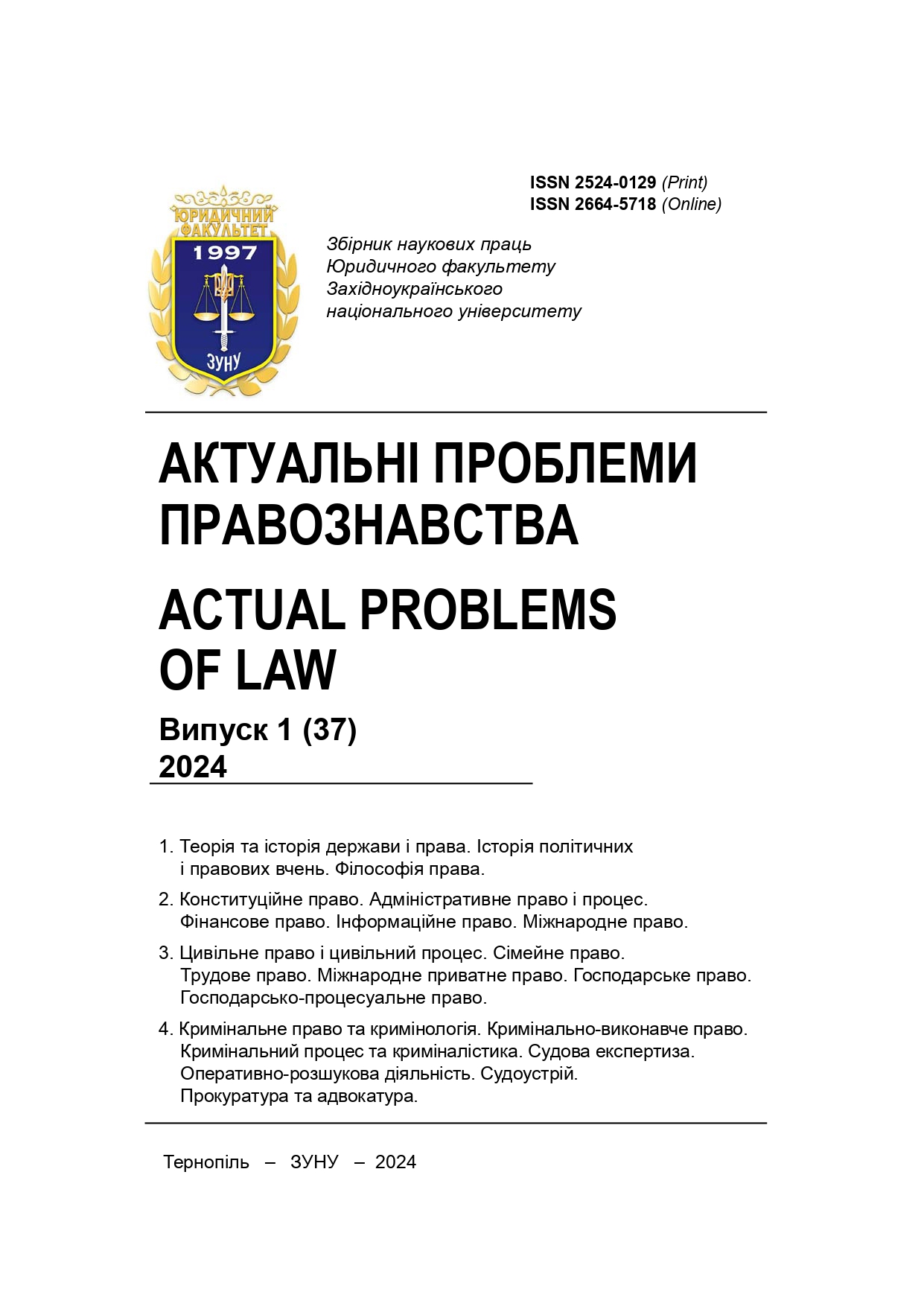The influence of global digital trends on the shadow economy: theoretical and legal aspect
DOI:
https://doi.org/10.35774/app2024.01.228Keywords:
shadow economy, security, digital technologies, digital shadow economy, cybercrimes, cyber securityAbstract
The problem of digitization in the shadow economy remains relevant in the modern world. Digital technologies can be both tools for combating the shadow economy and means it can use for its functioning and development. The purpose of the article is to study the theoretical and legal aspects of the impact of global digitization trends on the shadow economy. Based on the study of scientific sources, the concept of the digital shadow economy is defined as a hidden, informal, illegal, criminal activity that is carried out using digital technologies and is aimed at obtaining profit or other material or non-material benefit. The description of the tools that contribute to the fight against the shadow economy in the conditions of the use of digital technologies is given. The use of digital tools makes it possible to optimize the control systems of economic activity, identifying and monitoring shadow operations for more effective supervision by the authorities. New challenges and threats to cyber security, and directions for improvement of legal mechanisms for protection against cybercrimes and cyberattacks substantiated. In the conditions of digitalization, new challenges arise for legal regulation. Legislation needs to be adapted effectively control the shadow economy in the online environment.
References
Moshanets, O. Rozvytok tinovoyi ekonomiky: osvita proty tini [Development of the shadow economy: education against the shadow]. Retrieved from https://lb.ua/blog/olena_moshenets/523843_rozvitok_ekonomiki_osvita_proti.html [in Ukrainian]
Shevchuk, I. B., Deputat, B. Ya. & Tarasenko, O. Ye. (2019). Tsyfrovizatsiya ta yiyi vplyv na ekonomiku Ukrayiny: perevahy, vyklyky, zahrozy y ryzyky [Digitization and its impact on the economy of Ukraine: advantages, challenges, threats and risks.]. Prychornomorski ekonomichni studiyi - Black Sea Economic Studies, 47-2, 173-177. Retrieved from http://bses.in.ua/journals/2019/47_2_2019/34.pdf [in Ukrainian]
Hrazhevska, N. I. & Chyhyrynskyy, A. M. (2021). Tsyfrova transformatsiya ekonomiky v umovakh posylennya hlobalnykh ryzykiv i zahroz [Digital transformation of the economy in conditions of increased global risks and threats]. Ekonomika ta derzhava - Economy and the state, 8, 53–57 [in Ukrainian]
Khandiy, O. O. & Shamileva, L. L. (2019). Vplyv tsyfrovykh transformatsiy na ekonomiku ta sferu pratsi: sotsialʹno-ekonomichni ryzyky ta naslidky [Impact of digital transformations on the economy and the sphere of labor: socio-economic risks and consequences]. Ekonomichnyy visnyk Donbasu - Economic Herald of Donbass, 3, 181-188 [in Ukrainian].
Kindzerskyy, Yu. V. (2020). Kiberbezpeka ta stanovlennya tsyfrovoyi ekonomiky: problemy vzayemozvyazku [Cyber security and the formation of the digital economy: problems of interconnection]. Ekonomichnyy visnyk Dniprovsʹkoyi politekhniky - Economic Bulletin of the Dnipro Polytechnic, 3, 18-26. Retrieved from https://doi.org/10.33271/ebdut/71.018 [in Ukrainian]
Hrebenyuk, M. & Chernyak, A. (2019). Problemy protydiyi orhanizovaniy zlochynnosti u sferi tsyfrovoyi ekonomiky [Problems of combating organized crime in the sphere of the digital economy]. Pidpryyemnytstvo, hospodarstvo i pravo - Entrepreneurship, economy and law, 3, 297-303 [in Ukrainian].
Gaspareniene, L. & Remeikiene, R. (2015). Digital shadow economy: a critical review of the literature. Mediterranea Journal of Social Sciences, 6, 402–409 [in English]
Makovoz, O. S. Analiz zakonomirnostey funktsionuvannya tinovoyi ekonomiky [Analysis of the patterns of functioning of the shadow economy]. Retrieved from https://dspace.univd.edu.ua/server/api/core/bitstreams/4c8f1e13-edbb-472c-8c20-e721cdea2e9a/content [in Ukrainian]
Yip, M., Shadbolt, N., Tiropanis, N., & Webber, C. (2012). The digital underground economy: A social network approach to understanding cybercrime. In Digital Futures 2012: The Third Annual Digital Economy All Hands Conference. Retrieved from http://eprints.soton.ac.uk/343351/1/yip_de2012_submission.pd [in English]
Herley, C., & Florencio, D. (2010). Nobody sells gold for the price of silver: Dishonesty, uncertainty and the underground economy. Economics of Information Security and Privacy, 10. Retrieved from http://link.springer.com/chapter/10.1007%2F978-1-4419-6967-5_3#page-1 [in English]
Tsurkanenko, M. & Chuloy, D. (2023). TOP-7 zlochyniv u tsyfroviy industriyi svitu za ostanni 10 rokiv ta yikh naslidky [TOP-7 crimes in the world’s digital industry over the past 10 years and their consequences]. Yurydychna hazeta onlayn - Legal newspaper online, 1-2. Retrieved from https://yur-gazeta.com/publications/practice/informaciyne-pravo-telekomunikaciyi/top7-zlochiniv-u-cifroviy-industriyi-svitu-za-ostanni-10-rokiv-ta-yih-naslidki.html [in Ukrainian].

